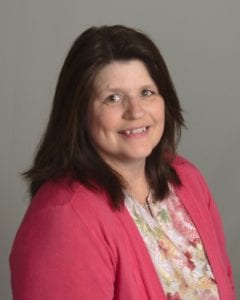 Tammy directs and oversees all aspects of her assigned projects ensuring compliance with registry standards and specifications. She ensures the goals and objectives of each project are met through oversight and quality control of her data abstraction teams. Additionally, she provides mentoring of on-site staff upon client request. Tammy resides in Michigan with her husband. They have four children and three grandchildren. In her spare time, Tammy enjoys sewing, planning parties, traveling to NFL and MLB stadiums across the nation and cheering on the Detroit Lions and Detroit Tigers.
Tammy directs and oversees all aspects of her assigned projects ensuring compliance with registry standards and specifications. She ensures the goals and objectives of each project are met through oversight and quality control of her data abstraction teams. Additionally, she provides mentoring of on-site staff upon client request. Tammy resides in Michigan with her husband. They have four children and three grandchildren. In her spare time, Tammy enjoys sewing, planning parties, traveling to NFL and MLB stadiums across the nation and cheering on the Detroit Lions and Detroit Tigers.
Tammy’s cancer registry experience includes serving as Oncology Program Coordinator for McLaren Lapeer Regional in Lapeer, Michigan where she has been involved with all aspects of the cancer program, serving as a project CTR for Registry Partners and Patient Care Coordinator for Loving Hands in Flint, Michigan.
Tammy earned her Master of Public Administration degree from the University of Michigan, Flint campus, her Bachelor of Science degree in Healthcare Administration from the University of Michigan, Flint campus and her Associate of Applied Science in Healthcare Administration from Oakland Community College in Auburn Hills, Michigan. Additionally she completed the Cancer Registry Management Certificate program through the American Health Information Management Association and earned her national Certified Tumor Registrar (CTR) certification through the National Cancer Registrars Association. Tammy is also a member of the National Cancer Registrars Association (NCRA) and the Michigan Cancer Registrars Association (MiCRA).
Q & A with Tammy:
Q: How did you become interested in the Cancer Registry profession?
A: I first learned about the Cancer Registry profession while I was completing my undergrad. I had a professor who would bring in different health care professionals in the area to talk about their positions, one of those professionals was a CTR from a local hospital. After she explained the role of a CTR and the importance of the data that was collected, I knew this was the career field I was meant to be in. I wanted to make a difference and change people’s lives, and that is what we do!
Q: Why do you believe clinical data registries are so important?
A: I believe clinical data registries are extremely important for the advancement of treatment, patient outcomes, quality of care, and patient safety. The information collected in clinical data registries is used to improve patient care; the information can be used to update evidence-based treatment guidelines, to compare the effectiveness of different treatments for the same disease or condition, or to evaluate surgical approaches / procedures.
Q: In your opinion, what makes your career interesting?
A: I live to learn and the cancer registry profession forwards me that opportunity because it is ever evolving, always changing, and never boring. Working alongside Physicians, Nurses, and other clinicians allows me to gain a better understanding of the treatment planning process and to continually improve as a CTR. When my daughter was diagnosed with breast cancer at age 30, I had the knowledge to ask the tough questions, and the capacity to understand what the doctors were saying, and not saying. Walking this journey with my daughter taught me so much that I have been able to apply to my job; it solidified why I am in this profession and reiterated what a crucial role we play in the lives of our patients.





